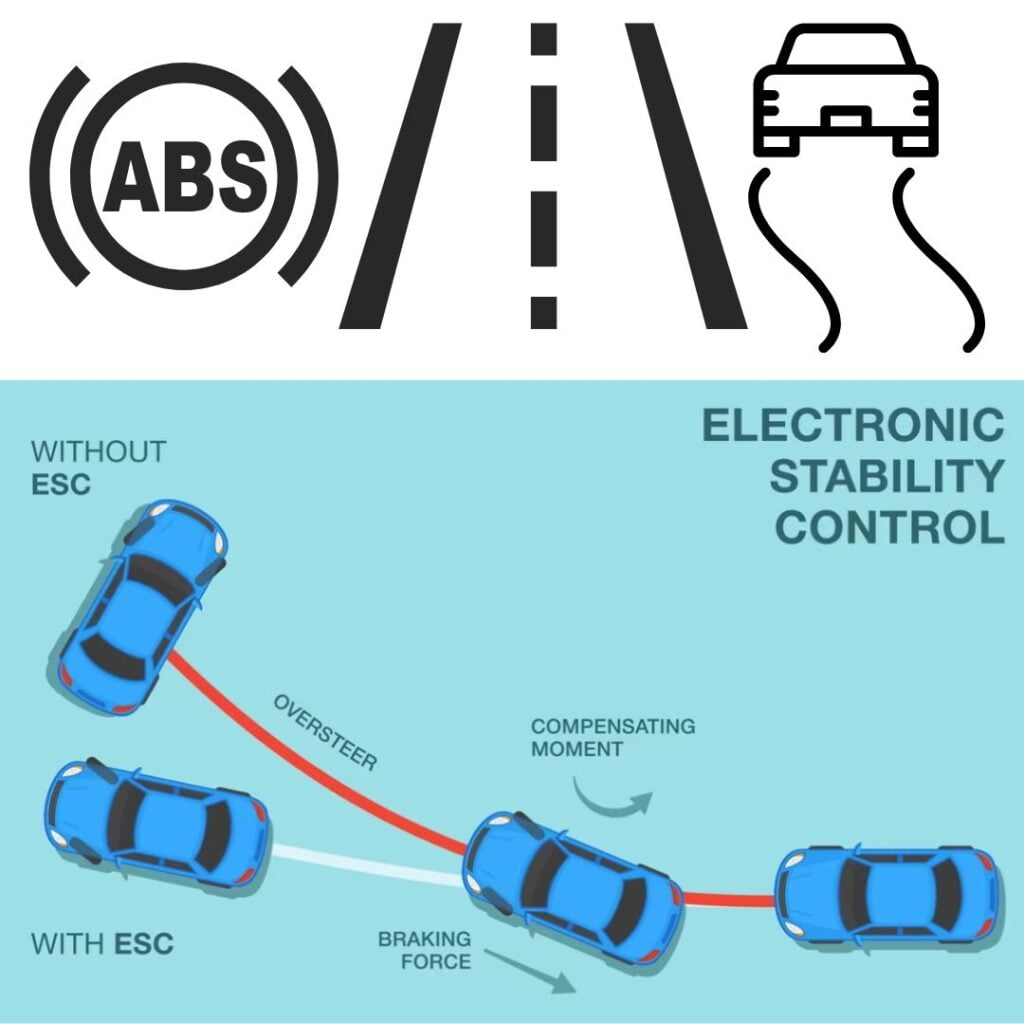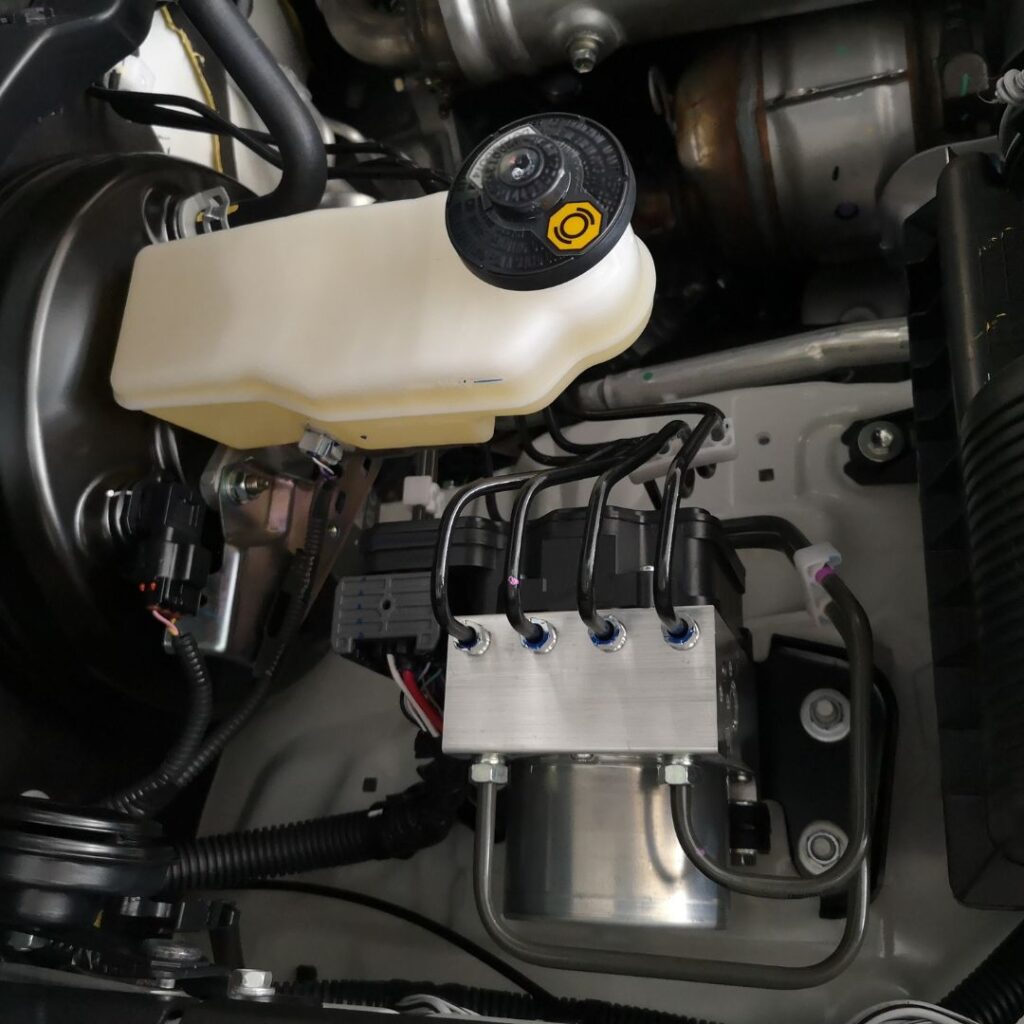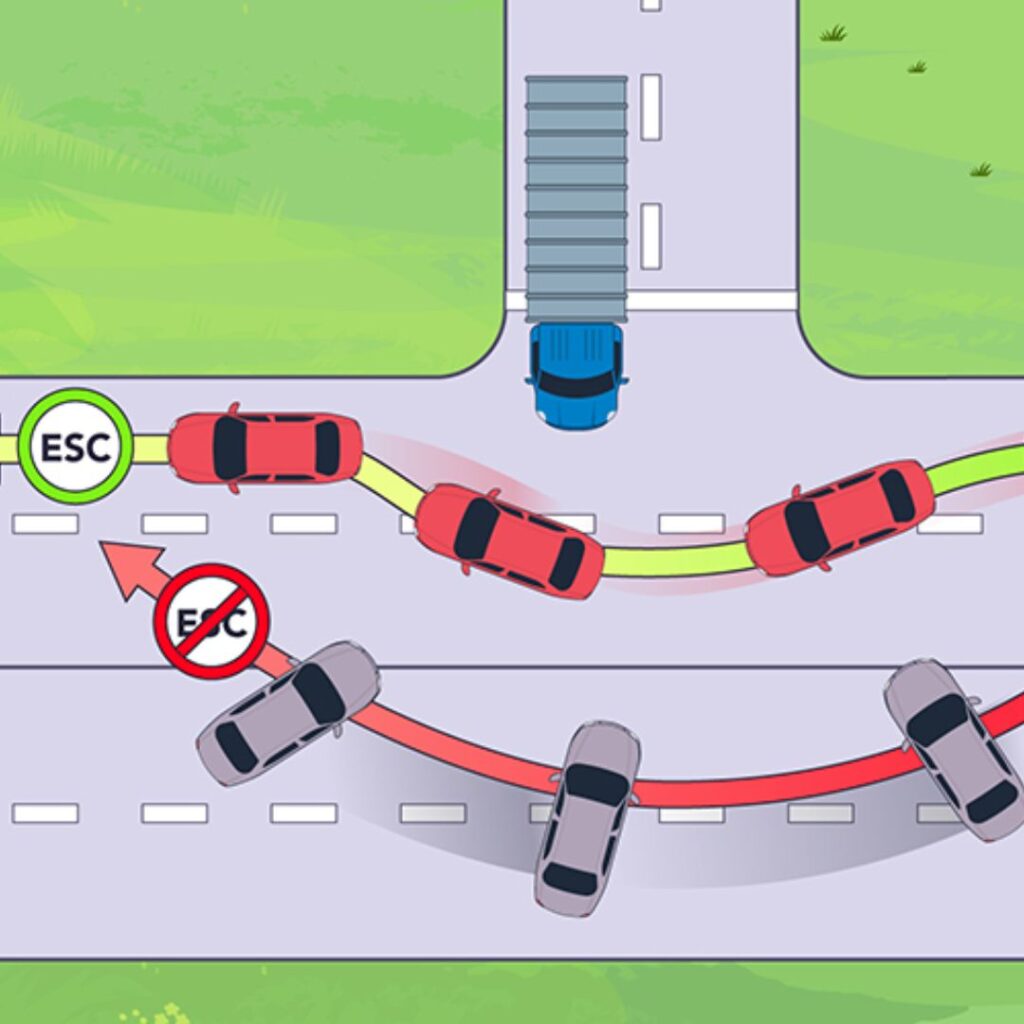What is Electronic Stability Control?
Electronic Stability Control (ESC) is a safety feature that helps drivers regain control of their vehicles while turning at high velocities or on slippery surfaces. It is one of the most effective safety systems aimed at preventing accidents from happening in the first place, rather than reducing the severity of injuries like airbags or seatbelts.
According to the National Highway Traffic Safety Administration (NHTSA), Electronic Stability Control has saved more than 7,000 lives from 2011-2015. In fact, ESC has been fitted as standard on all new cars since 2014.

But what is ESC, and how does it help you avoid skidding and spinning out of control? Let’s find out.
Read more: Global NCAP Rating for SUVs in India
How Does ESC Work?
Electronic Stability Control (ESC) works by monitoring the vehicle’s rotation, speed, and direction, and comparing them with the driver’s intended course. If the system detects a discrepancy between the two, it intervenes by applying brakes to individual wheels or reducing engine power to correct the vehicle’s trajectory and stabilize it.
To understand how ESC works, we need to look at the components that make it possible.
Wheels Speed Sensor
Every wheel on your car comes with a wheel speed sensor. This sensor consists of a perforated magnetic ring and a Hall effect sensor. As the wheel rotates, the magnetic field created by the ring changes periodically. The Hall effect sensor collects this data, enabling the sensor to calculate the speed of the wheels.
Yaw Rate Sensor
The yaw rate sensor monitors the vehicle’s rotation. To measure this rotation, the yaw rate sensor uses a micro-electromechanical gyroscope. This gyroscope measures the Coriolis force acting on the vehicle to estimate how much the car has rotated about its center of gravity.

Steering Angle Sensor
The steering angle sensor measures the angle and direction of the steering wheel. This sensor helps the system determine the driver’s intended course and compare it with the actual vehicle motion.
Electronic Control Unit
The electronic control unit (ECU) is the brain of the ESC system. It receives inputs from the sensors and analyzes them using a complex algorithm. Based on the analysis, the ECU decides whether to activate the ESC intervention or not.
Antilock Braking System
The antilock braking system (ABS) is a crucial part of the Electronic Stability Control system. It prevents the wheels from locking up when braking hard, which could cause skidding and loss of control. The ABS also allows the ESC system to apply brakes to individual wheels to correct the vehicle’s course.
Traction Control System
The traction control system (TCS) is another important component of the ESC system. It prevents the wheels from spinning when accelerating, which could cause loss of traction and stability. The TCS also allows the ESC system to reduce engine power to individual wheels to restore grip and balance.
What Are the Benefits of ESC?
ESC has many benefits for drivers and passengers. Some of the main benefits are:
- ESC reduces the risk of skidding and spinning out of control, especially on wet, icy, or slippery roads.
- ESC improves the vehicle’s handling and stability, especially during emergency maneuvers or sharp turns.
- ESC enhances the driver’s confidence and comfort, especially in challenging driving conditions or situations.
- ESC lowers the chances of rollover accidents, especially for SUVs and other high-center-of-gravity vehicles.
- ESC saves lives and prevents injuries, especially in single-vehicle crashes or run-off-road accidents.
How to Use ESC Effectively?
Electronic Stability Control (ESC) is a great safety feature, but it is not a substitute for careful and responsible driving. ESC can only help you within the physical limits of the vehicle and the road. Here are some tips on how to use ESC effectively:
- Do not rely on ESC to compensate for excessive speed, poor road conditions, or reckless driving. ESC cannot defy the laws of physics or prevent all accidents.
- Do not deactivate ESC unless absolutely necessary. ESC is designed to work in all driving situations and conditions. Deactivating ESC could reduce your safety and increase your risk of losing control.
- Do not ignore the ESC warning light. If the ESC warning light comes on, it means that the system is intervening to stabilize the vehicle. You should reduce your speed and adjust your driving accordingly. If the ESC warning light stays on, it means that there is a problem with the system. You should have your vehicle checked by a professional as soon as possible.
Electronic Stability Control (ESC) is a remarkable technology that can help you avoid skidding and spinning out of control. It can also save your life and prevent injuries in case of an accident. However, ESC is not a magic wand that can make you invincible on the road. You still need to drive carefully and responsibly, and follow the traffic rules and regulations. ESC is there to assist you, not to replace you.
Frequently Asked Questions (FAQs)
1. What is Electronic Stability Control (ESC)?
Answer: ESC is a computer-controlled system that helps drivers maintain control of their vehicle during critical driving situations like skids and loss of traction. It uses sensors to detect deviations from the intended path and applies brakes individually to different wheels to regain control.
2. How does ESC work?
Answer: ESC uses sensors to monitor steering angle, wheel speed, yaw rate, and other factors. By comparing these sensors to the driver’s intended direction, it can detect when the vehicle is losing control. It then applies brakes to individual wheels to correct the skid and help maintain stability.
3. Is ESC important?
Answer: Absolutely! Studies show ESC can significantly reduce crashes, injuries, and fatalities, especially in bad weather conditions. In fact, ESC is mandated in all new passenger vehicles sold in the US since 2012.
4. Can I turn off ESC?
Answer: Some vehicles allow you to temporarily disable ESC, but it’s generally not recommended. ESC can save you in situations where driver error might occur, even for experienced drivers. It’s best to keep it active for maximum safety.
5. Does ESC affect performance?
Answer: Modern ESC systems are very sophisticated and have minimal impact on overall vehicle performance. While you might feel a slight intervention during extreme maneuvers, the safety benefits far outweigh any potential performance drawback.
6. Are there different types of ESC?
Answer: Most ESC systems operate similarly, but some manufacturers might offer additional features like rollover mitigation or trailer sway control. Consult your vehicle’s manual for specific details.
7. Does ESC drain my battery?
Answer: ESC only activates when necessary and has minimal impact on battery life. Modern vehicles are designed to handle the power demands of such systems efficiently.
8. How can I tell if my car has ESC?
Answer: Look for the ESC symbol on your dashboard or consult your vehicle’s owner’s manual. You can also search online for specifications of your specific car model.
9. Can ESC help me avoid accidents altogether?
Answer: While ESC is a valuable safety technology, it’s not foolproof. It’s crucial to always practice safe driving habits like obeying speed limits, maintaining attention, and adjusting for weather conditions.
10. Is ESC the same as traction control or ABS?
Answer: ESC works in conjunction with other systems like traction control and anti-lock brakes (ABS), but it’s more comprehensive. While traction control helps prevent wheel slip during acceleration, and ABS prevents wheel lockup during braking, ESC integrates these functions and more to maintain overall vehicle stability in various driving situations.
Remember, ESC is a vital safety feature, and keeping it active can significantly improve your chances of staying safe on the road.

